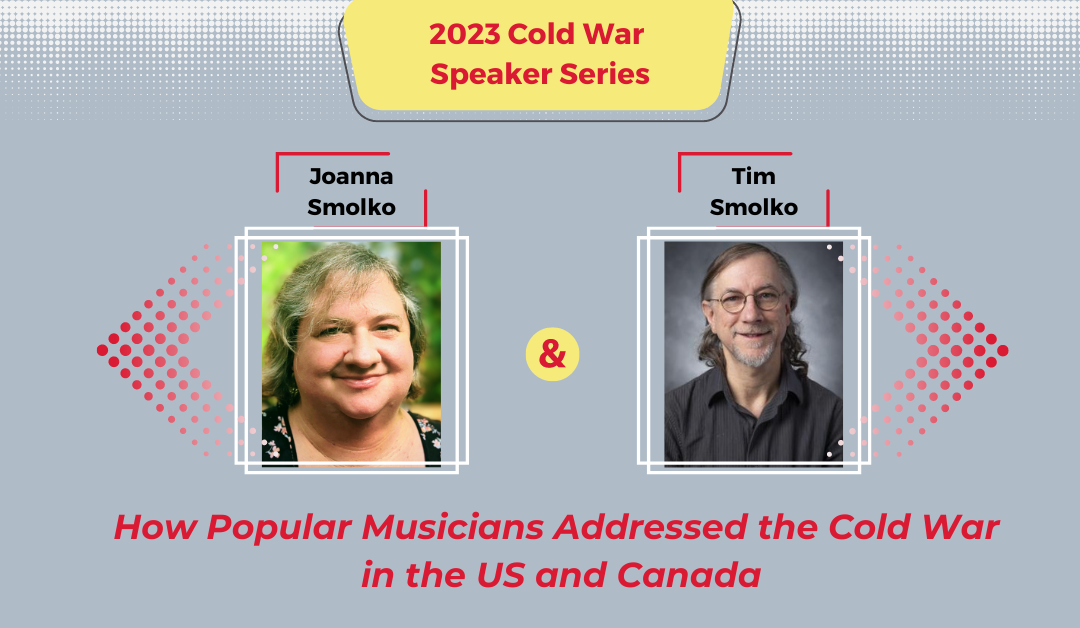Yesterday, October 12, 2023, we held the second session in this year’s Cold War Speaker Series, where we were pleased to welcome Joanna Smolko, adjunct professor in the musicology department at the University of Georgia, and Tim Smolko, academic librarian and musicologist at the University of Georgia. Joanna has written, coedited, and served as contributing editor on numerous publications including articles for academic journals, book chapters, and encyclopedia articles on an array of topics. Tim has also created original records for scholarly books in all branches of humanities. Together, the pair presented their topic, How Popular Musicians Addressed the Cold War in the US and Canada.
The Smolkos began their discussion with an overview of their 2021 book Atomic Tunes, which features pertinent Cold War themes and events such as the nuclear arms race, proxy wars, communism vs. capitalism, the Berlin Wall, and bomb shelters. Atomic Tunes explores how popular musicians from the 1940s to the 1990s expressed their views on these topics.
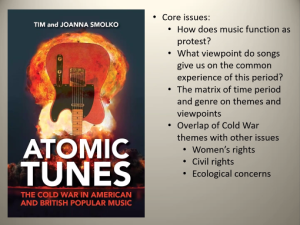
Slide borrowed from Joanna and Tim Smolko’s presentation on October 12, 2023.
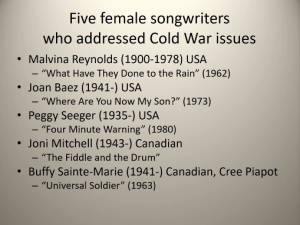
Slide borrowed from Joanna and Tim Smolko’s presentation on October 12, 2023.
Their presentation, like the chapters of Atomic Tunes, was divided into musical genres and focused on topics including women’s rights — specifically the Women Strike for Peace protest which ultimately led to the nuclear test ban treaty on October 10, 1963 — as well as worldwide peace efforts, fair and safe workplaces, and ecological impacts and causes. Joanna explored the multidimensional songwriting heard in folk music from the 1960s to the 1980s, including its portrayal of war-related information that was commonly known among people at the time. Joanna highlighted musicians like Malvina Reynolds, Joan Baez, Peggy Seeger, Buffy Sainte-Marie, and Joni Mitchell, all of whom relate global experiences from a personal perspective in their songs.
Listen to a few songs included in the presentation to understand the range musical styles found in Cold War tunes, as well as the varied emotions and perspectives conveyed by the music and lyrics:
“Little Boxes,” Malvina Reynolds, 1962
“Four Minute Warning,” Peggy Seeger, 1980
“Universal Solider,” Buffy Sainte-Marie, 1963
The Smolkos continued their discussion by transitioning from folk music to heavy metal and examined the influence that folk had on the progression of both rock and heavy metal in the early 1980s. Tim analyzed the powerful lyrics of several songs from the popular Canadian heavy metal band Rush. Their drummer and lyricist Neil Peart frequently addressed Cold War topics in his lyrics, making reference to the Distant Early Warning (DEW) Line and Oppenheimer and the Manhattan Project. Tim delved into the rise of music videos in the 1980s and highlighted Rush’s “Distant Early Warning” video from 1984 that served as an homage to the 1964 film Dr. Strangelove. This music video referenced the Cold War realities of humans having to wrangle with military technology for tactical use.
Listen to these songs:
“Distant Early Warning,” Rush, 1984
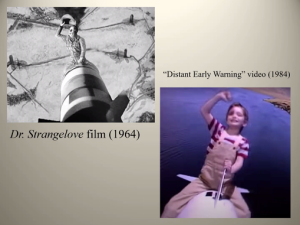
Slide borrowed from Joanna and Tim Smolko’s presentation on October 12, 2023.
“Manhattan Project,” Rush, 1985
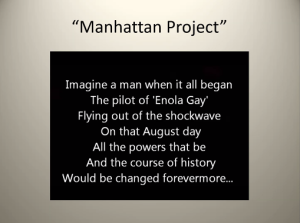
Slide borrowed from Joanna and Tim Smolko’s presentation on October 12, 2023.
Learn more about the music of the Cold War by watching the recording of Joanna and Tim Smolko’s presentation here:
Thank you Joanna and Tim for your intriguing discussion on How Popular Musicians Addressed the Cold War in the US and Canada. You can learn more about Joanna and Tim’s work on their website.
Tune in for the final session in our Cold War Speaker Series on Thursday, November 16, 2023 at 12:00 p.m., where Dr. Christabelle Sethna and Steve Hewitt will be discussing Spies, Lies, and Macho Guys: Documenting RCMP Surveillance against the Women’s Liberation Movement in Canada.
